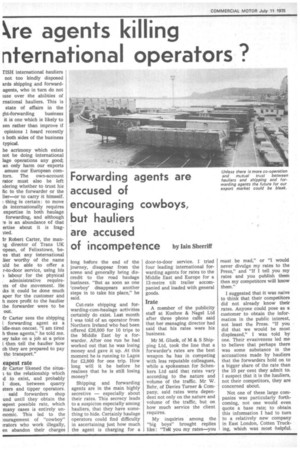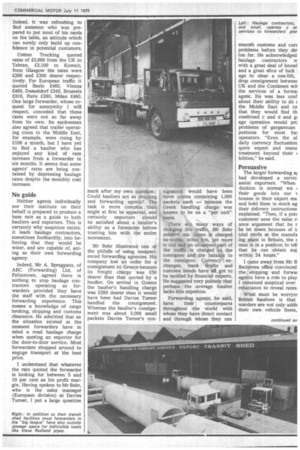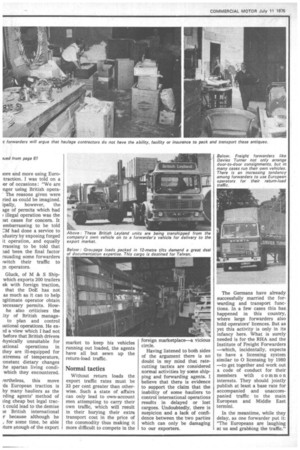kre agents killing iternational operators ?
Page 62

Page 63

Page 64

If you've noticed an error in this article please click here to report it so we can fix it.
Forwarding agents are accused of encouraging cowboys, but hauliers are accused
of incompetence by lain Sherriff DISH international hauliers not too kindly disposed ards shipping and forwardagents, who in turn do not iuse over the abilities of motional hauliers. This is state of affairs in the ght-forwarding business it is one which is likely to sen rather than improve if opinions I heard recently a bath sides of the business typical.
he 'acrimony which exists not be doing international [age operations any good; an only harm our exports amuse our European corntors. The own-account rector must also be left kdering whether to trust his he to the forwarder or the lier—or to carry it himself.
thing is certain: to move ds internationally requires expertise in both haulage forwarding, and although :e is an 'abundance of that ertise about it is frogited.
Ir Robert Carter, the manag director of Trans UK opean, of Felixstowe, bees that any international :tier worthy of the name uld be able to offer a r4o-door service, using his labour for the physical . administrative requireIts of the movement. He iks it could be done much aper for the customer and h more profit to the haulier the forwarder were to be out.
4r Carter sees the shipping [ forwarding agent as a [die-man oncost. "I am tired h these agents," he told me. ley take on a job at a price I then tell the haulier how eh 'they are prepared to pay the transport."
eapest rate
4r Carter likened the situa1 to the relationship which d to exist, and probably I does, between quarry sters and tipper operators.
said forwarders shop .und until they obtain the ,apest possible rate, which many cases is entirely uninomic. This led to the "ouragement of "cowboy" ?.rators who work illegally, en abandon their charges long before the end of the journey, disappear from the scene and generally bring discredit to the road haulage business. "But as soon as one 'cowboy' disappears another steps in to take his place," he said.
Cut-rate shipping and forwarding-cum-haulage activities certainly do exist. Last month I was told of an 'operator from Northern Ireland who had 'been offered £26,000 for 10 trips to the Middle East by a forwarder. After one run he had worked out that he was losing money and gave it up. At this moment he is running to Lagos for £2,800 for one trip. How long will it be before he realises that 'he is still losing money?
Shipping and forwarding agents are in the main highly secretive — especially about their rates. This secrecy leads to a suspicion especially among hauliers, that they have something to hide. Certainly haulage operators could find difficulty in ascertaining just how much the agent is charging for a door-to-door service. I tried four leading international forwarding agents for rates to the Middle East and Europe for a 12-metre tilt trailer accompanied and loaded with general goods.
Irate
A member of the publicity staff at Kuehne & Nagel Ltd after three phone calls said that her managing director had said that his rates were his business.
Mr M. Gluck, of M & S Shipping Ltd, took the line that a forwarder's rates are the best weapon he has in competing with less reputable colleagues, while a spokesman for Schenkers Ltd said that rates vary according to the nature and volume of the traffic. Mr W. Behr, of Davies Turner & Com• pany, said rates were dependent not only on the nature and volume of the traffic, but on how much service the client requires.
My inquiries among the "big boys" brought replies like: "Tell you my rates—you must be mad," or "I would never divulge my rates to the Press," and "If I tell you my rates and you publish them then my competitors will know them."
I suggested that it was naive to think that their competitors did not 'already know their rates. Anyone could pose as a customer to obtain the information in the public interest, not least the Press. "If you did that we would be most displeased," I was told by one. Their evasiveness led me to believe that perhaps there was some substance in the accusations made by hauliers that the forwarders hold on to a bigger share of the rate than the 10 per cent they admit to. I suspect that it is the hauliers, not their competitors, they are concerned about.
Not one of these large companies was particularly tforthcoming, not one would even quote a base rate; to obtain this information I had to turn to a relatively new company in East London, Cotten Trucking, which was most helpful. Indeed, it was refreshing to find someone who was prepared to put most of his cards on the table, an attitude which can surely only build up confidence in potential customers.
Cotten Trucking quoted rates of £3,000 from the UK to Tehran, £3,100 to Kuwait; from Glasgow the rates were £200 land £300 dearer respectively. For European traffic it quoted Basle £460, Vienna £460, Dusseldorf £345, Brussels £310, Paris £280, Milan £480. One large forwarder, whose request for anonymity I will respect, conceded that these rates were not so far away from its own. Its spokesman also agreed that trailer operating costs to the Middle East, for example, were rising by £100 a month, but I have yet to find a haulier who has enjoyed any kind of rate increase from a forwarder in six months. It seems that some agents' rates are being contained by depressing haulage rates despite the monthly cost increase.
No guide
Neither agents individually nor their institute on their behalf is prepared to produce a base rate as a guide to both hauliers and exporters. This is certainly why suspicion exists; it leads haulage contractors, sometimes foolhardily, into believing that they would be wiser, and are capable of, acting as their own forwarding agency.
Indeed, Mr A. Spraggans, of ABC (Forwarding) Ltd, of Felixstowe, agreed there is nothing to stop haulage contractors operating as forwarders provided they have the staff with the necessary forwarding experience. This means a knowledge of cargo broking, shipping and customs clearance. He admitted that as the situation existed at the moment forwarders have in mind a road haulage charge when quoting an exporter for the door-to-door service. Most forwarders shopped around to engage transport at the best price.
I understand that whatever the rate quoted the forwarder is looking for between 5 and 10 per cent as his profit margin. Having spoken to MT Behr, who is the sales manager (European division) at Davies Turner, I put a large question mark after my own question: Could hauliers act as shipping and forwarding agents? The task is more complex than might at first be apparent, and certainly exporters should be satisfied about a haulier's ability as a forwarder before trusting him with the entire movement.
Mr Behr illustrated one of the pitfalls of using inexperienced forwarding agencies. His company lost an order for a consignment to Greece because its freight charge was £50 dearer than that quoted by a haulier. On arrival in Greece the haulier's handling charge was £280 dearer than it would have been ihad Davies Turner handled the consignment. Whereas the haulier's consignment was about 3,000 small packets Davies Turner's con signment would have been three crates containing 1,000 packets each — because the Greek handling charge was known to be on a "per unit" basis.
There aie many ways of charging the traffic, Mr Behr pointed out. Some is charged ex-works other fob, yet more is cod and on occasions part of the traffic is charged to the consignee and the balance to the consignor. Currency exchanges, bank drafts and customs bonds have afl got to be tackled by financial experts. He suggested very politely that perhaps the average haulier lacks this expertise.
Forwarding agents, he said, have their counterparts throughout the world with whom they have direct contact and through whom they can smooth customs and curt problems before they del too far. He acknowledged haulage contractors ry with a great deal of knowl and a great Slice of luck : age to clear, a one-lift, drop 'consignment betweer UK and the 'Continent wil the services of a forwai agent. He was less conf about their .ability to do f. the Middle East and ce that they would find th combined c and d and gi age operation would pro problems of gargantuan portions for most hai operators. "Even the al daily currency fluctuation quire expert and imrne treatment beyond their 4 bilities," he said.
Persuasive
The larger forwarding al had developed a servile assist exporters. "When duction is normal we their goods into our N houses in their export ma and hold them in stock ag their delivery instruction's explained. "Then; if a putt customer uses the sales ri ance argument that he r be let down because of it trial strife at the manufa mg plant in Britain, the s man is in a position to tell that he can obtain sur within 24 hours."
I came away from Mr B Battersea office convinced the shipping and forwai agents have a role to play I remained sceptical over reluctance to reveal rates.
What must be worryin British hauliers is that warders are not only addii their own vehicle fleets, iore and more using Eurotraction. I was told on a ,er of occasions : "We are Tiger using British operaThe reasons given were ried as could be imagined. ipally, however, the age of permits which had r illegal operation was the a-st cause for concern. It embarrassing to be told had done a service to idustry by exposing forged it operation, and equally rrassing to •be told that lad been the final factor rsuading some forwarders witch their traffic to operators.
Gluck, of M & S Ship which exports 200 trailers ek with foreign traction, that the DoE has not as much as it can to help agitimate operator obtain lecessary permits. Howhe also criticises the ity of British manage to plan and control iational operations. He ex?d a view which I had not before that British drivers ohysically unsuitable for iational operations in they are ill-equipped for xtremes of temperature, :onstant dietary changes he spartan living condiwhich they encountered.
tertheless, this move :cis European traction is by many hauliers as the rding agents' method of ring cheap but legal tract could lead to the demise ie British international r because although he , for some time, be able iture enough of the export market to keep his vehicles running out loaded, the agents have all but sewn up the return-load traffic.
Normal tactics
Without return loads the export traffic rates must be 33 per cent greater than otherwise. Such a state of affairs can only lead to own-account men attempting to carry their own traffic, which will result in their burying their extra transport cost in the price of the commodity thus making it more difficult to compete in the foreign marketplace—a vicious circle.
Having listened to both sides of the argument there is no doubt in my mind that ratecutting tactics are considered normal activities by some shipping and forwarding agents. I believe that there is evidence to support the claim that the inability of some 'hauliers to control international operations results in delayed or lost cargoes. Undoubtedly, there is suspicion and a lack of confidence between the two parties which can only be damaging to our exporters. The Germans have already successfully married the forwarding and transport functions. In a few cases this has happened in this country, where large forwarders also hold operators' licences. But as yet this activity is only in its infancy here. What is surely needed is for the RHA and the Institute of Freight Forwarders —which, incidentally, expects to have a licensing system similar to 0 licensing by 1980 —to get together and work out a code of conduct for their members with common interests. They should jointly publish at least a base rate for accompanied and unaccompanied traffic to the main European and Middle East termini.
In the meantime, while they delay, as one forwarder put it: "The Europeans are laughing at us and grabbing the traffic."












































































































































